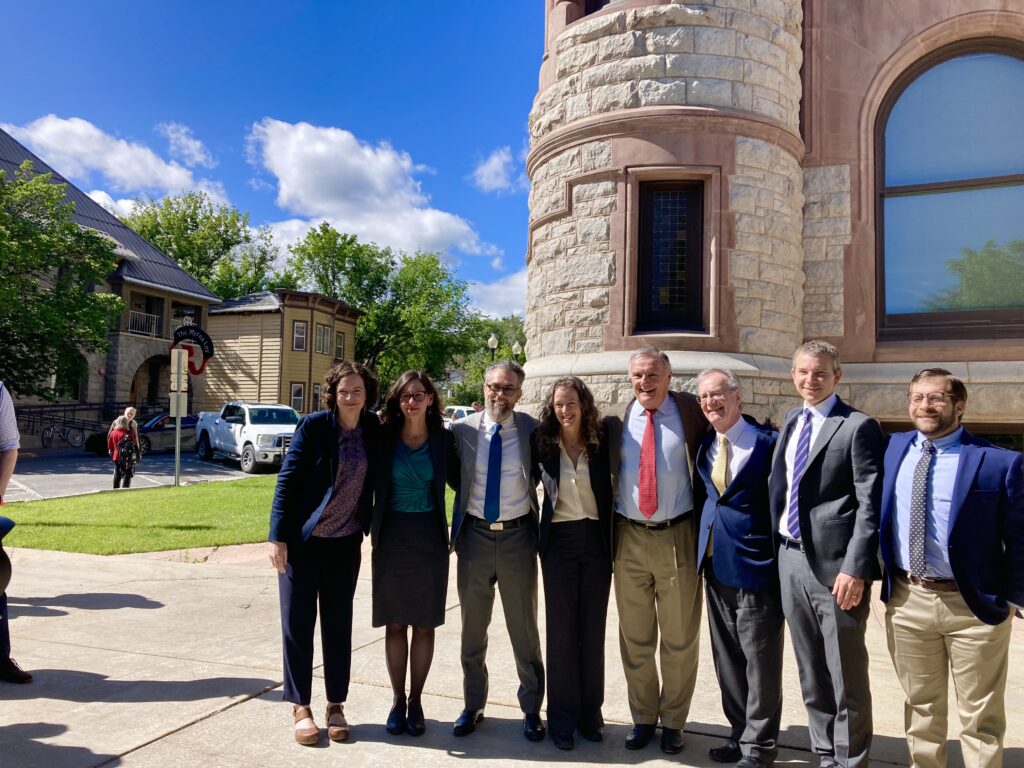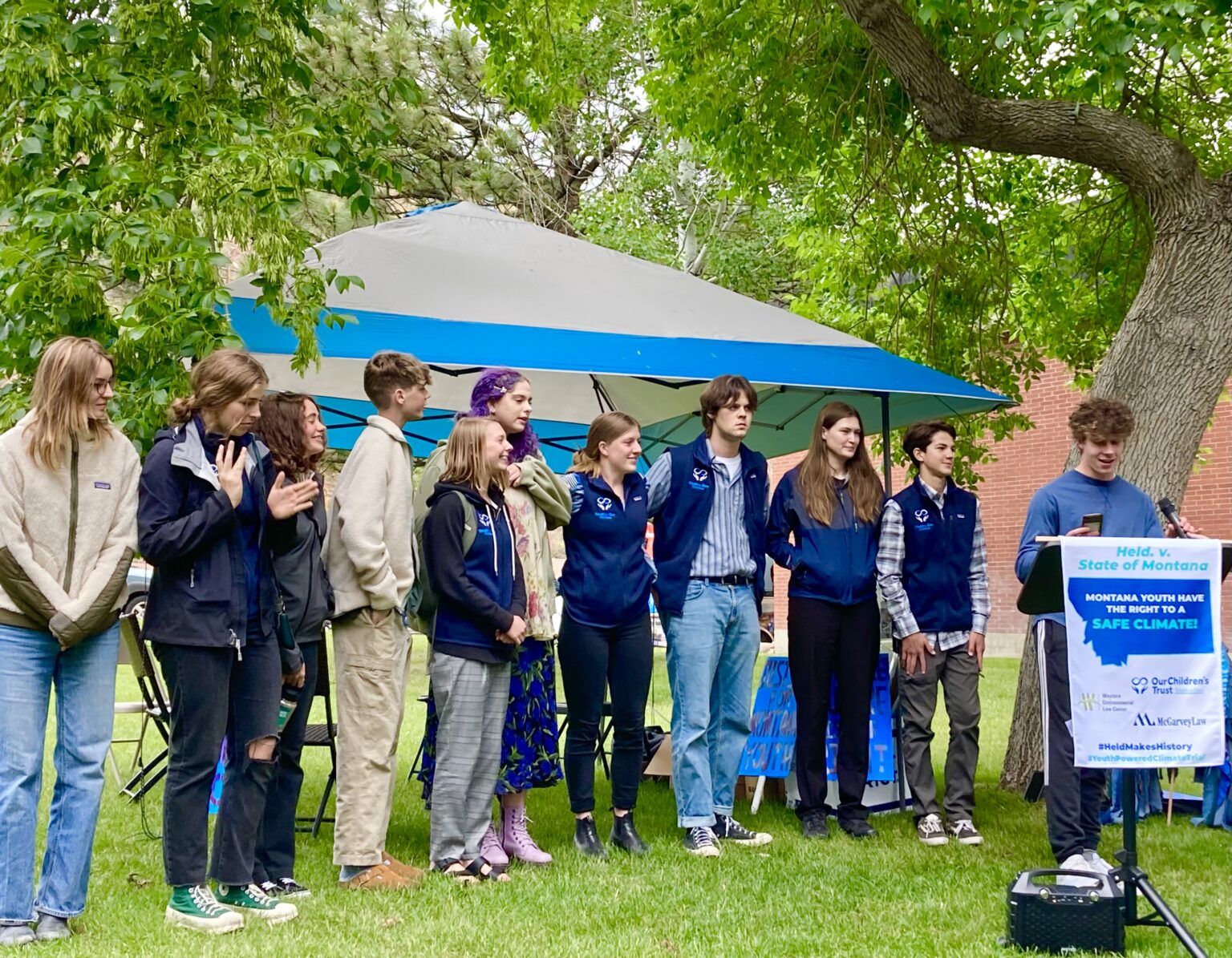A Montana court ruled in favor of 16 young people who put their state government on trial in June in the first constitutional climate trial in U.S. history. In an order issued Monday, Judge Kathy Seeley in the First Judicial District Court of Montana found that the state had violated youth plaintiffs’ constitutional rights, including the right to a clean and healthful environment, because of Montana’s pro-fossil fuel policies, which require the state to disregard climate change and greenhouse gas emissions in environmental reviews.
“As fires rage in the West, fueled by fossil fuel pollution, today’s ruling in Montana is a game-changer that marks a turning point in this generation’s efforts to save the planet from the devastating effects of human-caused climate chaos,” Julia Olson, chief legal counsel and executive director of Our Children’s Trust, a nonprofit law firm that represented the youth plaintiffs, said in a statement. “This is a huge win for Montana, for youth, for democracy, and for our climate. More rulings like this will certainly come.”
The Held v. State of Montana case, first filed in 2020, argued that Montana’s longstanding actions and policies supporting fossil fuel development — despite clear knowledge of the climate consequences — contribute to environmental degradation and violate the young plaintiffs’ rights to a “clean and healthful environment.” Montana’s constitution explicitly grants that right, as do some other state constitutions, like Pennsylvania’s and New York’s. Montana’s constitution also extends it and other inalienable rights to its youngest citizens.
During Montana’s 2023 legislative session, which ended in May, the Republican supermajority passed a number of bills that weaken environmental protections. This included a controversial amendment to the Montana Environmental Policy Act (MEPA) that some had called the “most aggressive” anti-climate bill in the nation. That law, House Bill 971, dubbed the “MEPA limitation,” expressly prohibited state agencies, including the Montana Department of Environmental Quality, from evaluating greenhouse gas emissions in environmental permits. As the Held case went to trial, the question of this statute’s constitutional compliance was front and center.
In her decision, Judge Seeley left no doubt that H.B. 971 was “unconstitutional on its face.” Her order overturns it, as well as another related piece of new legislation, Senate Bill 557. This bill bars MEPA litigation brought against the state on climate grounds from thwarting or delaying any permitting or authorization.
BREAKING! In historic first, Judge Kathy Seeley ruled wholly in favor of the 16 youth plaintiffs in Held v. State of Montana, declaring that the state of Montana violated the youth’s constitutional climate rights. Read press release: https://t.co/pybs9kaUJs #YouthvGovMT pic.twitter.com/R1CHjeNWLR
— Our Children's Trust (@youthvgov) August 14, 2023
“This ruling, this case; it is truly historic. We are heard,” 18-year-old plaintiff Kian Tanner said in a statement. “Frankly the elation and joy in my heart is overwhelming in the best way. We set the precedent not only for the United States, but for the world.”
Montana Democratic state Senator Mary Ann Dunwell, whose district covers eastern Helena, told DeSmog that the ruling sends a strong message to her Montana legislature colleagues who are climate deniers.
“It states in our constitution that the legislature has a responsibility, it’s our job to make sure that we uphold that right to a clean and healthful environment,” she said. “The majority Republican legislature these past two sessions has violated that.”
“To me it’s vindicating, this ruling is vindicating,” Dunwell added. “The youth had a strong case and frankly the state had a very weak one.”
In its narrow defense presented in just one day, state attorneys steered clear of engaging in climate science. To the extent the state did discuss climate impacts, it claimed that Montana’s emissions “are simply too minuscule to make any difference.”
The Montana attorney general’s office did not reply to a request for comment from DeSmog. The office sent a comment to Montana’s ABC/Fox News website stating that, “the ruling is absurd,” and the trial was a “weeklong taxpayer-funded publicity stunt” that showed Montana has “no impact on the global climate.” The comment noted the state will appeal.
But Seeley’s ruling recognized the scientific fact that every additional ton of greenhouse gas pollution emitted exacerbates climate impacts. “Montana’s GHG [greenhouse gas] emissions and climate change have been proven to be a substantial factor in causing climate impacts to Montana’s environment and harm and injury to the Youth Plaintiffs,” she wrote.
The decision further affirmed that Montana’s right to a clean and healthful environment includes climate, as a stable climate is “part of the environmental life-support system.”
Inspiration for Similar Climate Lawsuits
Professor Michael Gerrard, director of the Sabin Center for Climate Change Law at Columbia Law School, called the ruling “the strongest decision on climate change ever issued by any court.”
“After a trial where climate scientists testified under oath and were subject to cross examination (very rare in itself), the court issued a 103-page decision that found that fossil fuel use is the principal cause of climate change, which is in turn causing serious health and environmental impacts that will continue to get worse,” he wrote in a statement emailed to DeSmog.
He added that the court found that renewable energy, like wind, solar, and hydro, can economically substitute for fossil fuels.
This ruling “may inspire similar lawsuits around the world,” Gerrard said.

Another youth-led climate case spearheaded by Our Children’s Trust will be going to trial next summer in Hawaii, the scene of the deadliest wildfire disaster the United States has seen in more than a century. Like Montana, Hawaii also has the right to a clean and healthful environment embedded in its constitution, and this case involves climate pollution authorized by the state’s Department of Transportation.
“This [Montana] decision could have an impact on the OCT case pending in Hawaii, which is scheduled for trial in 2024 and it may well inspire other cases in states like Pennsylvania and New York with similar constitutional provisions,” Patrick Parenteau, professor of law emeritus and senior fellow for climate policy at Vermont Law and Graduate School, told DeSmog. “The [federal] Juliana case has inspired youth lawsuits in other countries like Germany, France, and Columbia, as well as the European Court of Human Rights, and this decision is sure to spur even more.”
Subscribe to our newsletter
Stay up to date with DeSmog news and alerts






